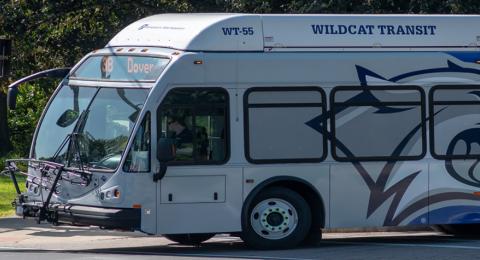Transportation
UNH’s commitment to sustainable transportation includes the way we manage our fleet and support other sustainable options for our entire community. Under a framework of Transportation Demand Management, which seeks to reduce our use of single-occupancy vehicle private vehicles, UNH's Transportation Policy Committee (TPC) takes a holistic approach. This includes expanded free transit services, increased on- or near-campus housing, development of improved transit and bicycle/pedestrian infrastructure, partnerships with Amtrak, ZipCar, and others, and ongoing informational programs to expanded mobility without private vehicle use. Our goal is maximizing mobility and accessibility in a climate protection framework that emphasizes health and safety, efficiency, cost-effectiveness, equity, accessibility and sustainability. UNH actively works with the state Department of Transportation and regional MPO to coordinate transit and intermodal transportation activities and is a critical player in the regional transit system which connects eight communities to Durham, providing over 1.2 million passenger trips per year.
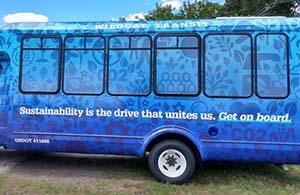
UNH also collects data on its transportation systems (transit, vehicle fuel consumption, mileage) and community transportation needs and behaviors as a way of benchmarking and tracking progress in its sustainable transportation system goals. This data collection allows us to measure effectiveness versus peer institutions.
In spring of 2022, UNH was awarded the largest single transportation grant of the past twenty five years - although we have a track record of over 40 federal and state transportation awards totaling more than $23M. EcoCat transit fleet begins next step forward to cleaner transit with new USDOT funding Award.
UNH supports the use of car-sharing and ride-sharing as a way to reduce our community’s transportation “footprint"; learn more about:

STARS EVALUATION
TRANSPORTATION (4.63/7)
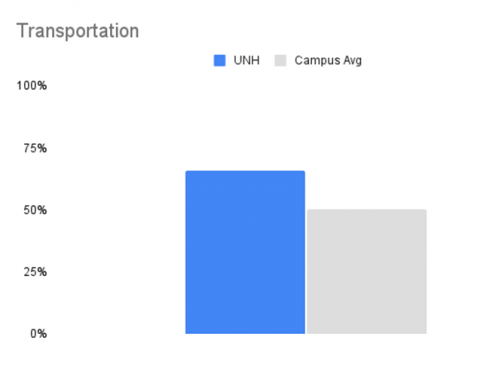
UNH earned 66% of total points available (4.63/7) compared to an AASHE member average of 50.45%.
STARS “seeks to recognize institutions that are moving toward sustainable transportation systems. Institutions may realize cost savings and help support local economies by reducing their dependence on petroleum-based fuels for transportation.”
UNH's Fleet
In 2009, UNH unveiled Eco-Cat™ labeling on all UNH alternative fuel and clean technology vehicles to educate riders and local residents about the environmental and economic benefits of UNH's growing suite of such transit and non-transit vehicles.
UNH’s fleet runs primarily on alternative, low- or no-emissions fuels:
- We transitioned the diesel fleet to the use of low sulfur B20 biodiesel.
- All of UNH’s new transit vehicle purchases since 2008 have been CARB certified B20 diesel or CNG low-floor buses with bike racks.
- For non-transit vehicles, UNH has developed a new EcoCat calculator, helping departments "right size" a vehicle for their needs. Departments are asked to use this tool when selecting new vehicles for purchase. In addition, UNH’s recent fleet vehicle purchases have been electric and we now have multiple Nissan Leafs as part of our UNH vehicle fleet.

Transit Offerings
UNH boasts the state’s largest public transit system – Wildcat Transit! We host both on- and off-campus transit:
- Campus Connector: UNH's free, on-campus shuttle system that is open to all in the UNH Durham community and runs primarily on compressed natural gas.
- Wildcat Transit: UNH's off-campus transit system that is free to UNH ID holders and $1.50 for general public access. Handicap accessible with bike racks for use on all buses, Wildcat Transit connects the UNH community with the Campus Connector shuttle system, with local, state, and region-wide commercial bus service, and with the Dover and Durham Amtrak Downeaster train stations. Wildcat Transit also offers a guaranteed ride home program for transit riders during the academic year.
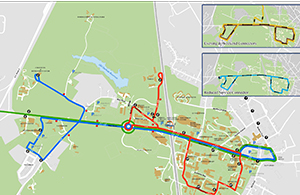
Promoting Bicycling
UNH works closely with the Town of Durham and NHDOT to expand the biking infrastructure in Durham. Recent improvements to Main Street, College Road, and others have seen bike lanes and shared lanes. UNH has also been expanding the bike parking on campus with standardized racks and functional art racks across campus.
Departmental Bike Program
UNH has a bike share program specifically geared toward staff and faculty for travel around campus.
Community Bike-Share Program: Cat Trax
UNH has had several iterations of a campus-wide bike share program, the first launched in 2005. In spring 2021, Campus Planning and the Sustainability Institute undertook an outreach and survey campaign to get feedback on a new iteration of a community bike share program. The Transportation Policy Committee approved this initiative, and in fall 2022 Cat Trax was launched!
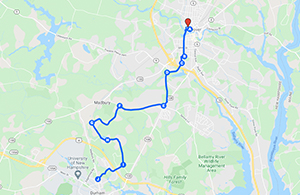
Ride your bike to UNH!
Linked below are maps of bike routes from nearby towns and that avoid major roadways–tried and true routes by members of the Sustainability Institute and many other staff and faculty biking enthusiasts!
Support for Electric Vehicles
In addition to finding opportunities to integrate electric vehicles (EV) into our own fleet, UNH is working toward supporting EV use by the broader community. In 2015 we partnered with the Town of Durham to site our first (Level 2) EV charging station on campus. In 2018 we passed our first policy related to the development of campus-wide EV infrastructure, which will direct future grant and direct investment plans.

Supporting Remote Work
UNH saw great success with a transition toward remote work during the height of the COVID-19 pandemic and is continuing to provide this option for employees whose work is able to be successfully completed remotely. To facilitate this process, the University offers Flexible Work Arrangement Policies. Employees interested in some version of a hybrid and/or remote work arrangement complete a form and then work with their managers to assess and, if appropriate, implement flexible remote work arrangements.

